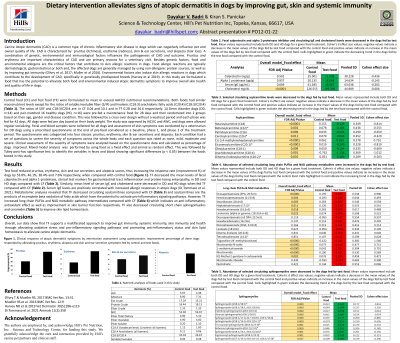Back

Objectives: Atopic dermatitis (AD) is a common skin disorder in dogs. We hypothesize that dietary intervention alleviates AD by improving gut, skin, systemic immunity and skin health.
Methods: Control food (CF) and Test food (TF) were formulated to meet or exceed AAFCO nutritional recommendations. Both foods had similar macronutrient levels (fat: 16.2% ±1.2, protein: 17.2% ±0.9, carbohydrate: 52.9% ±0.9, crude fiber: 1.1% ±0.05, total dietary fiber: 5.0% ±0.1, moisture: 8.1% ±0.9 and ash: 4.2% ±0.2) except for the ratios of soluble:insoluble fiber (S/IF) and linolenic (C18:3):arachidonic fatty acids (C20:4) (C18:3/C20:4). The ratios of S/IF and C18:3/C20:4 are: in CF 0.04 and 10.1 and in TF 0.27 and 26.6 respectively. 14 Derm disorder dogs (DD, n=14) and pair-matched 16 healthy dogs (HD, n=16) were pre-fed a maintenance food for 28 days and then randomized into 2 groups based on their age, gender and disease condition followed by a cross-over design without a washout period and each phase was fed for 42 days. Fecal and blood samples were collected for all dogs and assessment of skin symptoms was conducted by a veterinarian for DD dogs.
Results: There was an improvement in the response rate of reduced pruritus, erythema, alopecia, skin and ear secretion severity in DD by 53.8%, 46.1%, 7.6% and 38.4% respectively, when fed TF compared with CF. Mean level of fecal calprotectin and alpha 1-proteinase were decreased in DD and HD dogs when fed TF (11.8 ng/g & 18.0 µg/g) compared with CF (25.0 ng/g & 20.1 µg/g), with ±Sp 30.2 & 14.6, respectively. Similarly, mean level of serum IgE and cholesterol were decreased in DD and HD dogs when fed TF (48.8 µg/ml & 199.2 mg/dL) compared with CF (61.5 µg/ml & 226.5 mg/dL), with ±Sp 63.0 & 44.9, respectively. Metabolomic analyses revealed that TF decreased circulating acylcarnitines, but increased long chain PUFAs and NAD metabolic pathway intermediates compared with CF which indicating an anti-inflammatory, antioxidant and improvement in skin barrier function respectively. TF also decreased circulating short chain sphingomyelins and ceramides to improve skin lipid homeostasis.
Conclusions: TF intervention alleviates AD via multifaceted approach by improving gut, skin and systemic immunity and skin health in dogs.
Funding Sources: This study was funded by Hill’s Pet Nutrition, Inc.
Experimental Animal Nutrition
(PO12-01-22) Dietary Intervention Alleviates Signs of Atopic Dermatitis in Dogs by Improving Gut, Skin and Systemic Immunity

- DB
Dayakar V. Badri, PhD
– Senior Scientist, Hills PNC, Topeka, Kansas, United States - KP
Kiran S. Panickar, Ph.D.
– Life Science Lab manager, Hills PNC, Topeka, Kansas, United States
Presenting Author(s)
Co-Author(s)
Disclosure(s):
Dayakar V. Badri, PhD: No relevant financial relationship(s) with ineligible companies to disclose.
Objectives: Atopic dermatitis (AD) is a common skin disorder in dogs. We hypothesize that dietary intervention alleviates AD by improving gut, skin, systemic immunity and skin health.
Methods: Control food (CF) and Test food (TF) were formulated to meet or exceed AAFCO nutritional recommendations. Both foods had similar macronutrient levels (fat: 16.2% ±1.2, protein: 17.2% ±0.9, carbohydrate: 52.9% ±0.9, crude fiber: 1.1% ±0.05, total dietary fiber: 5.0% ±0.1, moisture: 8.1% ±0.9 and ash: 4.2% ±0.2) except for the ratios of soluble:insoluble fiber (S/IF) and linolenic (C18:3):arachidonic fatty acids (C20:4) (C18:3/C20:4). The ratios of S/IF and C18:3/C20:4 are: in CF 0.04 and 10.1 and in TF 0.27 and 26.6 respectively. 14 Derm disorder dogs (DD, n=14) and pair-matched 16 healthy dogs (HD, n=16) were pre-fed a maintenance food for 28 days and then randomized into 2 groups based on their age, gender and disease condition followed by a cross-over design without a washout period and each phase was fed for 42 days. Fecal and blood samples were collected for all dogs and assessment of skin symptoms was conducted by a veterinarian for DD dogs.
Results: There was an improvement in the response rate of reduced pruritus, erythema, alopecia, skin and ear secretion severity in DD by 53.8%, 46.1%, 7.6% and 38.4% respectively, when fed TF compared with CF. Mean level of fecal calprotectin and alpha 1-proteinase were decreased in DD and HD dogs when fed TF (11.8 ng/g & 18.0 µg/g) compared with CF (25.0 ng/g & 20.1 µg/g), with ±Sp 30.2 & 14.6, respectively. Similarly, mean level of serum IgE and cholesterol were decreased in DD and HD dogs when fed TF (48.8 µg/ml & 199.2 mg/dL) compared with CF (61.5 µg/ml & 226.5 mg/dL), with ±Sp 63.0 & 44.9, respectively. Metabolomic analyses revealed that TF decreased circulating acylcarnitines, but increased long chain PUFAs and NAD metabolic pathway intermediates compared with CF which indicating an anti-inflammatory, antioxidant and improvement in skin barrier function respectively. TF also decreased circulating short chain sphingomyelins and ceramides to improve skin lipid homeostasis.
Conclusions: TF intervention alleviates AD via multifaceted approach by improving gut, skin and systemic immunity and skin health in dogs.
Funding Sources: This study was funded by Hill’s Pet Nutrition, Inc.

.png)
